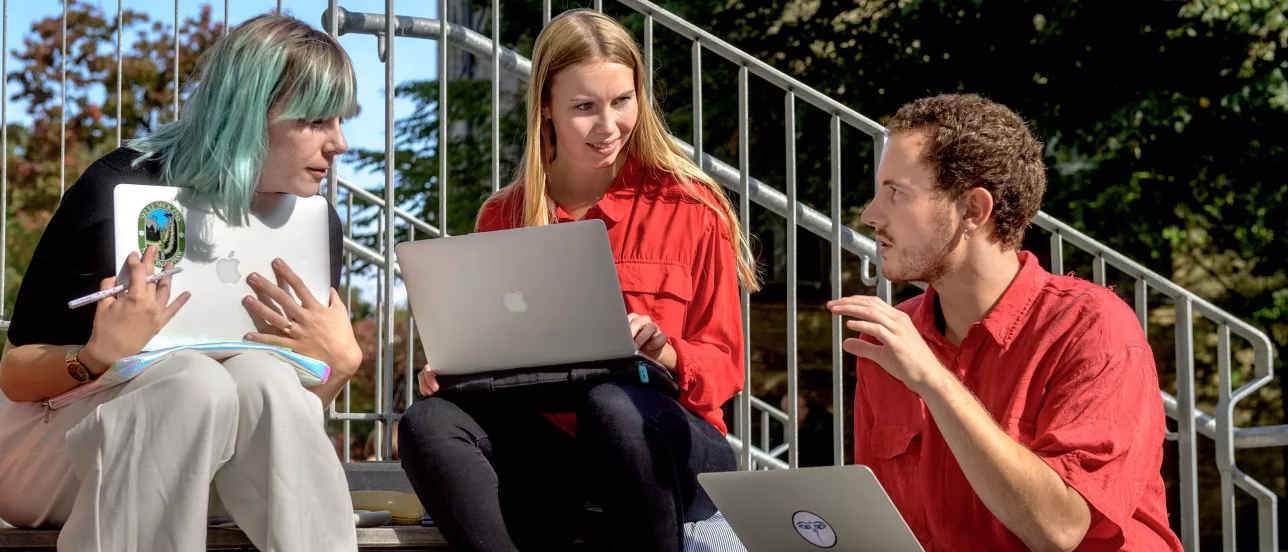Sociology - Master of Science programme
Master's programme · 2 years · 120 credits

Description
The Master of Science Programme in Sociology will give you the knowledge and skills to adapt to a changing working life and the ability to contribute to development in society. The programme provides specialisation in the scholarly approach that is fundamental if you are aiming to pursue PhD studies, but which is also of considerable value if you are aiming for a career doing advanced work as a policy or operational officer in different kinds of organisations at different levels.
The MSc in Sociology (programme code SASCO) will prepare you for PhD studies in sociology as well as for advanced professional work. It combines deep subject knowledge with broadening perspectives.
You will have considerable freedom to select courses according to interest and future needs. The programme enables you to develop critical thinking, analytical skills and the ability to conduct societal analysis, as well as to acquire specialised knowledge of sociology. On completion of the programme, you will be awarded a degree of Master of Science (120 credits) specialising in sociology.
The programme is given on Campus in Lund at the Department of Sociology: http://www.soc.lu.se/en
Language of instruction: English.
In the programme, you will gain:
knowledge and understanding in sociology, including both broad knowledge of the field and a considerable degree of specialised knowledge in certain areas of the field as well as specialised insight into current research and development work.
specialised knowledge of research methods in sociology.
the ability to critically and systematically integrate knowledge, and to analyse, assess and deal with complex phenomena, issues and situations, even with limited information.
the ability to identify and formulate research questions critically, autonomously and creatively as well as to plan and, using appropriate methods, undertake advanced tasks within predetermined time frames and so contribute to the formation of knowledge as well as the ability to evaluate this work.
the skills required for participation in research and development work or autonomous employment in some other qualified capacity.
The programme also offers you the possibility to apply for a double degree with Fudan University in Shanghai, which means that you can get two degrees within the two years of studies, one from Lund University and one from Fudan University. For more information please contact our Study Advisers: studievagledare [at] soc [dot] lu [dot] se.
Courses and credits
- Semester 1: Classical and Contemporary Theory (SOCN03, 15 credits), Methods and Social Analysis (SOCN06, 15 credits)
- Semester 2: Modern Classics (SOCN04, 15 credits) or Selected courses in theory of science and research methods given by Graduate School (15 credits). Please go to Graduate School's website for more information.
- Semester 3: Internship (SOCN20 or SOCN21, 30 credits). Please go to The Department of Sociology's website for more information. or Study abroad (30 credits) or Elective courses (30 credits). (Ethnographic fieldwork SANN15, 15 credits, can be included as an elective course. More info on soc.lu.se).
- Semester 4: Master’s thesis (SOCM04, 30 credits)
Closed for applications
Application opportunitiesClosed for applications
Learn more about our application periods and when to apply for studies at Lund University.
Contact
Study Adviser at the Department of Sociology
Britt Marie Rönn
Email: studievagledare [at] soc [dot] lu [dot] se
Requirements and selection
Entry requirements
To be eligible for the programme the applicant must have the equivalent of a Swedish Bachelor’s degree with a major (i.e. at least 90 ECTS credits) in Sociology or equivalent.
A good command of English language both spoken and written, equivalent to English 6/B (advanced) proficiency in the Swedish secondary system, is required. Equivalence assessments will be made according to national guidelines.
Selection criteria
The applicants estimated capacity to complete the programme is the primary criterion for selection. Students are selected on the basis of their previous study results (grades on courses and Bachelor’s degree essay), proficiency in English and statement of purpose.
English language requirements
Most of Lund University’s programmes require English Level 6 (unless otherwise stated under 'Entry requirements'). This is the equivalent of an overall IELTS score of 6.5 or a TOEFL score of 90. There are several ways to prove your English language proficiency – check which proof is accepted at the University Admissions in Sweden website. All students must prove they meet English language requirements by the deadline, in order to be considered for admission.
How to prove your English proficiency – universityadmissions.se
Country-specific requirements
Check if there are any country-specific eligibility rules for you to study Bachelor's or Master's studies in Sweden:
Country-specific requirements for Bachelor's studies – universityadmissions.se
Country-specific requirements for Master's studies – universityadmissions.se
Apply
Start Autumn Semester 2024
Day-time Lund, full time 100%
In English
Study period
2 September 2024 - 7 June 2026
Application
Closed for applications
How to apply
Lund University uses a national application system run by University Admissions in Sweden. It is only possible to apply during the application periods.
Step 1: Apply online
- Check that you meet the entry requirements of the programme or course you are interested in (refer to the section above on this webpage).
- Start your application – go to the University Admissions in Sweden website where you create an account and select programmes/courses during the application period.
Visit the University Admissions in Sweden website - Rank your programme/course choices in order of preference and submit them before the application deadline.
Step 2: Submit documents
- Read about how to document your eligibility and how to submit your documents at the University Admissions in Sweden website. Follow any country-specific document rules for Master's studies or Bachelor's studies
Country-specific requirements for Bachelor's studies – universityadmissions.se
Country-specific requirements for Master's studies – universityadmissions.se
- Get all your documents ready:
- official transcripts and high school diploma (Bachelor's applicants)
- official transcripts and degree certificate or proof that you are in the final year of your Bachelor's (Master's applicants)
- passport/ID (all applicants) and
- proof of English proficiency (all applicants).
- Prepare programme-specific documents if stated in the next paragraph on this webpage.
- Upload or send all required documents to University Admissions before the document deadline.
- Pay the application fee (if applicable – refer to the section below on this webpage) before the document deadline.
* Note that the process is different if you are applying as an exchange student or as a part of a cooperation programme (such as Erasmus+).
* If you have studied your entire Bachelor's programme in Sweden and all of your academic credits are in Ladok, you do not have to submit transcripts or your diploma when applying for a Master's programme. However, there may still be other documents you need to submit! See the link below.
* Svensk student?
Läs instruktionerna om att söka till ett internationellt masterprogram på lu.se
Programme-specific documents
In addition to the documents mentioned under Step 2, you must also submit a statement of purpose (letter of intent) of around one page when you apply for this programme.
The statement of purpose should give precise but brief information concerning:
- your main interests within the field of sociology
- your reasons for applying to the programme
- how you hope to benefit from the programme
- what future plans you have after completion of the programme.
An application without a statement of purpose will not be considered.
Tuition fees
Non-EU/EEA citizens
Full programme/course tuition fee: SEK 250 000
First payment: SEK 62 500
Citizens of a country outside of the European Union (EU), the European Economic Area (EEA) and Switzerland are required to pay tuition fees. You pay one instalment of the tuition fee in advance of each semester.
Tuition fees, payments and exemptions
EU/EEA citizens and Switzerland
There are no tuition fees for citizens of the European Union (EU), the European Economic Area (EEA) and Switzerland.
Application fee
If you are required to pay tuition fees, you are generally also required to pay an application fee of SEK 900 when you apply at the University Admissions in Sweden website. You pay one application fee regardless of how many programmes or courses you apply to.
- Paying your application fee – universityadmissions.se
- Exemptions from paying the application fee – universityadmissions.se
- Convert currency – xe.com
*Note that there are no tuition or application fees for exchange students or doctoral/PhD students, regardless of their nationality.
Scholarships & funding
Lund University Global Scholarship programme
The Lund University Global Scholarship programme is a merit-based and selective scholarship targeted at top academic students from countries outside the EU/EEA.
Lund University Global Scholarship
Swedish Institute Scholarships
The Swedish Institute offers scholarships to international students applying for studies in Sweden at Master's level.
Scholarship information on the Swedish Institute website
Country-specific scholarships and funding options
Lund University has agreements with scholarship organisations and funding bodies in different countries, which may allow applicants to apply for funding or scholarships in their home countries for their studies at Lund University.
External scholarships
Career
Career prospects
The programme provides you with both the background knowledge and the practical skills needed to work in a broad range of fields including governmental, non-governmental and the private sector.
You will be prepared for a future career as a policymaker, a leader or a practitioner working in government agencies, private companies or NGOs, or, alternatively, for doctoral studies and a continued academic career. The programme will give you the knowledge and the skills to adapt to a changing working life, and the ability to contribute to development in both society and in working life.
Testimonials

Meet our student ambassador
Read RuoXuan's testimonial and chat with her via Unibuddy.

”What I like the most is that it is based on student interaction”
Georgios from Greece

"A non-hierarchical teaching style that allows you to grow"
Nur from Indonesia